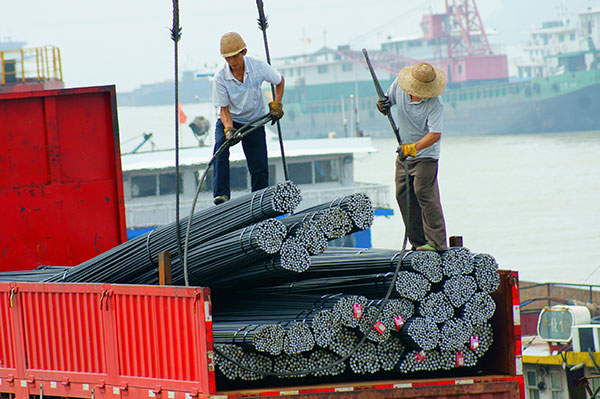Steelmakers hit by glut in production, sinking prices
(Agencies) Updated: 2015-08-13 07:40
 |
|
Workers load steel products at a logistics park in Yichang, Hubei province. Steelmakers are reducing output, adding to signs of waning demand in the world's largest producer as firms grapple with overcapacity, sinking prices and slowing economic growth. [Zhou Jianping / China Daily] |
The country's steelmakers reduced output last month, adding to signs of waning demand in the world's largest producer as companies grappled with overcapacity, sinking prices and slowing economic growth.
Crude-steel output fell 4.6 percent to 65.84 million metric tons from June, data from the National Bureau of Statistics showed on Wednesday.
Production in the first seven months was 476 million tons, 1.8 percent less than a year earlier. Demand for steel in Asia's largest economy is falling for the first time in a generation, spurring mills to ship record amounts of the alloy overseas as prices slump.
The yuan sank on Wednesday for a second day after China devalued it, and the move may help steelmakers sell even more of their output abroad.
Lower steel production will hurt demand for iron ore, though, which tumbled to the lowest since at least 2009 last month.
The drop also showed "that downstream infrastructure and property had no recovery, therefore demand for steel remained weak".
Major mills in China, including Hebei Iron & Steel Co and Baoshan Iron & Steel Co, are the linchpin of the global industry, accounting for about half of the supply.
The country's production probably peaked in 2014, according to a forecast from the China Iron & Steel Association.
Output of steel products fell 6.2 percent to 92.3 million tons in July from a month earlier, according to the bureau. In terms of daily production, output averaged 2.977 million tons last month from 3.281 million tons a month ago, it said.
Steel reinforcement bars used in construction dropped to 2,102 yuan ($327) a ton last month, the lowest price since at least 2003, according to Beijing Antaike Information. It was at 2,322 yuan on Tuesday, 16 percent lower than at the start of this year.
Mills around Beijing including those in Hebei province, the largest producing region, may face government-ordered curbs later this month and in September as policymakers seek to clean up the air for a parade and sports event.
The moves will hurt steel output, Australia & New Zealand Banking Group Ltd said on Tuesday.
"Some of the output cuts might become permanent as the government and market work in tandem to squeeze out the least-efficient and loss-making capacity," said Li Yaozhong, head of commodities at Beijing Low Risk Asset Management Co.
Iron ore with 62 percent content in Qingdao fell 0.3 percent to $56.22 a ton on Tuesday, according to Metal Bulletin Ltd. Prices, which bottomed at $44.59 on July 8, are 21 percent lower this year.
- 2015 China International Fair for Investment and Trade kicks off in Xiamen
- China's commodity imports robust in Jan-Aug period
- China stocks rebound 2.92%
- 2015 China box office already past 2014 total
- China foreign trade decline widens in August
- Interview: JP Morgan's senior executive bullish on China
- Innovation, development the focus for NZ mayors
- Lives of freelancers

















